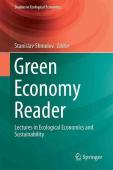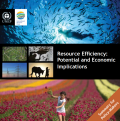The mature, sustainable Bioeconomy will help deliver global food security, improve nutrition and health, create smart bio-based products and biofuels, and help agriculture, forestry, aquaculture and other ecosystems to adapt to climate change. This White Paper describes the chances of and the frame for an integrated and sustainable bioeconomy in Europe. It shows how the Bioeconomy can address the grand societal challenges and, sets out a vision for 2030 together with a set of policy recommendations needed to achieve it.
This Policy Highlights on Green Growth Indicators focuses on measuring progress towards green growth, analysing the sources of green growth and identifying relevant indicators for decision-makers and the wider public is essential for assessing green growth policies. The OECD framework identified 25 to 30 indicators under the four categories: 1) Environmental and resource productivity; 2) The natural asset base; 3) The environmental dimension of quality of life; 4) Economic opportunities and policy responses. Also indicators that describe the socio-economic context and the characteristics of growth are considered in order to complement the main indicators under the four groups.

The Green Economy Reader is a collection of thought provoking articles by the leading ecological economics thinkers of our time. State of the art in sustainability thinking, inspired by interdisciplinary ideas of ecological economics, this book is focusing on sustainability pathways, new economic theory, democracy and institutions, multidimensional assessment of sustainability, macroeconomic modelling and policies, climate change and renewable energy, resource flows and circular economy, regenerative cities, environmental conflicts and values. It will be helpful for MSc and PhD students in Economics, Management, Environmental Change, Ecological Economics, Development Economics, Sustainability and practitioners in business, international and nongovernmental organizations, such as UNDP, UNEP, IUCN, OECD. Rich, diverse and thought provoking collection of top level contributions, it will help to facilitate the transition towards sustainability and educational reform.

The eradication of extreme poverty is the minimum ethical floor of the global development agenda. With projections suggesting eradication is possible by 2030, the goal of ‘zero extreme poverty by 2030’ is a compelling objective.
However, climate change could be an obstacle to achieve this goal. It would hit the very poor hardest, making it tougher for those in extreme poverty to escape it, and drawing the moderately poor back into extreme poverty. Countries will need even greater ambition, and great support, to adapt and limit impacts on the poor.
But adaptation to climate extremes becomes increasingly implausible, particularly for the poorest, as we move beyond 2°C global mean temperature rise. Avoiding surpassing 2°C will require zero net greenhouse gas (GHG) emissions before the century’s end. To achieve zero emissions, and indeed to peak in the next couple of decades, all countries need to transform their economies.
